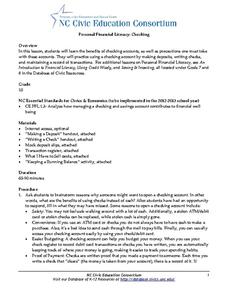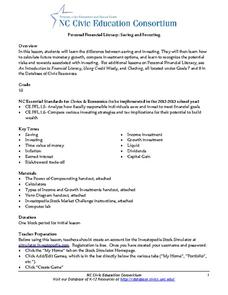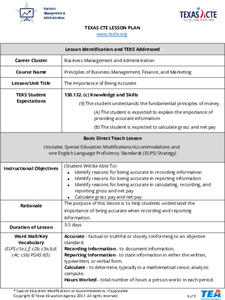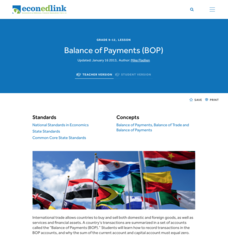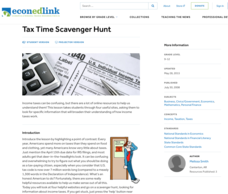Center for Literacy and Disability Studies
Personal Financial Literacy: Checking
After researching local banks and the checking account benefits offered by each, class members practice filling out a deposit slip, writing a check, and keeping a transaction register.
Carolina K-12
Personal Financial Literacy: Saving and Investing
When should you save, and when should you invest? In considering this question, your class members will also learn about the time value of money, inflation, compounded interest, and income/growth investments. The resource also outlines...
Carolina K-12
Personal Financial Literacy: Using Credit Wisely
What is credit, and what are its advantages and disadvantages for purchases? Your class members will learn about different types of loans, such as student and mortgage, how interest factors into credit use, credit reports, and ultimately...
Nebraska Department of Education
This I Believe
As part of a Career Develop unit, eighth-graders reflect on their beliefs and values and consider how these beliefs might affect their relationships with friends and with colleagues when they join the workforce.
Nebraska Department of Education
Time Management
As eighth-graders move on to high school, strong time management skills become critical. As part of a career Planning & Management unit, scholars learn how to analyze their time and consider how their choices impact their ability to...
Nebraska Department of Education
Who Am I?
When people look in a mirror, they rarely see themselves as others see them. Tweens and teens can consider the significance of these disparities in a lesson that asks them to reflect on the kind of person they are and how they think...
Nebraska Department of Education
How Do You Define “Friend?”
Shared values are often the keystone in friendships. Class pairs use their "Values" handout from a previous instructional activity and interview one another to identify values they share and don't share. Then, consider how their...
Nebraska Department of Education
Managing My Money
Rent, food, utilities, gas, clothing, taxes! It all adds up. As part of a career planning and management unit, high school sophomores learn about financial planning and budgeting.
Beyond Benign
Final Budget
Be sure you have enough money to build a house. The 14th lesson in a 15-part series teaches young learners to use checkbook registers. They write checks for the amounts they spend on various housing materials and keep track of spending...
K20 LEARN
Identity Theft: Don't Let This Happen to Your Grandma!
Class members consider how people steal online identities as they discover the essential elements of identity theft and consumer fraud. Pupils demonstrate learning by creating a poster or video about how to avoid identity theft.
Texas Education Agency (TEA)
Importance of Being Accurate
Accuracy is key! Using the detailed resource, scholars practice their presicion skills, taking online spelling and typing tests. Next, they demonstrate accuracy by calculating the gross and net pay of five hypothetical employees.
California Department of Education
California CareerZone Make Money Choices Student Workbook
An activity challenges scholars to make smart money choices. While visiting the California CareerZone website, pupils choose between budgeting for one's lifestyle or salary and complete a two-page worksheet based on the information...
Texas Education Agency (TEA)
Creating a Lifestyle Budget
Using the practical resource, pupils view a PowerPoint and complete a KWL chart to learn all about budgeting. To finish, they create a budget based on their projected lifestyle profiles.
Texas Education Agency (TEA)
Piggy Bank vs. Bank – Choosing and Maintaining Your Account
Cha-ching! Using the practical resource, scholars investigate the different types of bank accounts and banking services available. Pupils view a PowerPoint, practice writing checks, and complete a checking account research project.
Texas Education Agency (TEA)
Identity Theft and Credit Safety
Deter, detect, defect. Pupils watch a PowerPoint presentation and video about identity theft and credit card safety, taking notes to use later. Next, they develop a plan for maintaining credit safety and write an essay about the topic.
Radford University
The Game of Life … Mathematics Style
Make life more organized using mathematics. Scholars get a good look at budgeting and personal finance by using linear equations. They research salary information and costs to develop mathematical models, including equations and graphs.
Radford University
Budgeting Your Time and Money
Use mathematics to better manage money. Pupils learn about budgets and personal finance with a set of three lessons. They research salary data for their chosen careers, look up various costs of living to develop budgets, and plan an...
New York City Department of Education
The Game of Life
Academics use their research skills to create a financial guidebook for young adults. They also learn about the skills needed to be successful as an adult, including how to use credit cards and how to buy a car. Hands-on activities and...
Council for Economic Education
China - Where Will They Fit in the World Economy?
Teach scholars why China is so crucial to global economics through an informative resource. Activities include using databases to search for information, watching a video or listening to a podcast, and reading about China's economy as a...
Insurance Zebra
Insurance Curriculum for Middle and High School Teachers
Liability, deductible, premium ... what do these words mean, and how do they relate to insurance? Scholars complete a pre-test, matching vocabulary activity, and insurance timeline worksheet and become familiar with these terms. Next,...
Council for Economic Education
A Penny Saved
A penny saved is a penny earned! Scholars research the different ways to save money over a lifetime. They investigate the Rule of 72, compound interest, and sub-prime loans to gain an understanding of how banks aid in the saving process....
Council for Economic Education
Balance of Payments (BOP)
Have you ever checked your clothes to see how many nations created them? Pupils take a deeper look at international trade and the balance of payments nations have with one another. They use calculations, simulations, and primary sources...
iCivics
Step 7: Fill the Holes
It's time to communicate without using emojis or hashtags! In the seventh step of a 10-part County Solutions - High School unit scholars analyze professional communication when accomplishing a goal. They use examples, research, and data...
Council for Economic Education
Tax Time Scavenger Hunt
Is a 1040EZ tax form really easy? Scholars investigate the complexities of the United States taxation system with an economics lesson. Using a wide variety of web sources, they interpret IRS taxation rules and regulations to better...


